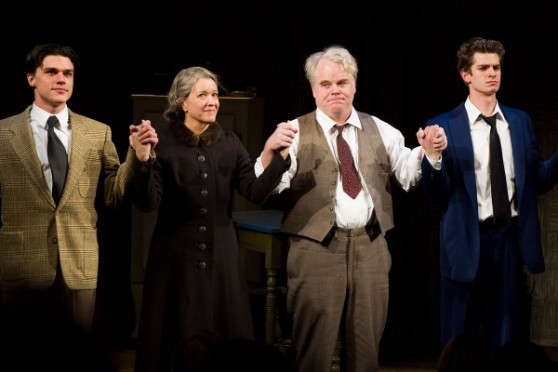Death of a Salesman: Strange new world

Ben Brantley’s New York Times review of the current production of Death of a Salesman at the Barrymore is very complimentary, but also regretful — that the version doesn’t quite land with him; that, like Linda Loman at the end of the play, he “can’t cry.” Brantley admires the design, the performances, Mike Nichols’s direction, but compares the production to the aridly formal experience of visiting a national monument, and argues that nearly every lead gives a fantastic performance but is miscast. Philip Seymour Hoffman as Willy “never seems a credible 62,” Brantley sighs, and Andrew Garfield’s physicality as Biff isn’t quite a fit.
I saw the play yesterday with Wing, and I agree with most of Brantley’s…you know, “criticisms” isn’t the correct term. “Misgivings” is more accurate. In any case, he’s right that Hoffman, as outstanding as he is, doesn’t read as old and mentally frail as well as he might (he’s 44). Brantley’s reluctant comparison of Garfield to a “weedy, tormented James Dean” is perhaps too harsh, but as much as I like Garfield and as much as he leaves everything on the field with his performance here, he’s not very believable as a gridiron god, even a high-school one, when he’s meant to have played in the age of leather helmets. (He’s not helped there by sharing the stage almost constantly with Finn Wittrock, who fully realizes Hap in a way I’ve never seen before and who is much closer visually to the king-of-the-world brick-shithouse figure Biff allegedly cut/s.)
The thing about Death of a Salesman, though, is that I feel like you always have those issues with the casting; you always have a Willy who’s too much one age or the other, or a Biff who’s laugh-out-loud ridiculous as a high-schooler. The 1985 film version we had to watch in school piled a shit-ton of makeup on Dustin Hoffman, threw John Malkovich at the Biff role (and Stephen “Colonel Angry Biceps in Avatar” Lang as Hap! Man, I’m-a have to rewatch that foolishness now), and hoped for the best, and that’s in a movie, where you can cheat the flashbacks. You can’t do that onstage. …Well, you can, but I doubt many directors bother, not with everyone who speaks English knowing the play and looking for the seams. It’s almost impossible to cast the entire production with actors who can cover the entire age spread and act the parts without getting their heads and torsos digested by some of the most legendary writing in theater; I see Brantley’s point, I cede Brantley’s point, I think Brantley himself knows it’s unsporting to make the point at all, but the performances pull it off 85 percent of the time. (I categorically disagree with his assertion that Linda Emond’s Linda is too forceful. It’s not a choice or a timbre the actress ordinarily goes with, and I’m not entirely sure it holds that this vigorous a Linda would not have tired of Willy’s relentless puffery decades ago, but it was fresh, and it made me think, so I can live with it.)
Most of the performances do that — get you to reevaluate lines you’ve heard and studied and received in the same way for years. You can miscast Death of a Salesman up to a pretty far point because the writing, its brilliant rendition of familiar confusion and irresolvable pain, its inexorable tensions, will carry the rest of the production. It does that here at times (Wing and I had both tightened into crab claws by the end), but at other times, the actors give you something for the first time. Garfield and Wittrock come off annoyingly too-much in many of the flashbacks, not credible in their worship of their gasbag father, the gee-willikers dialogue and the rolled-up pants — but as I said, nobody’s going to get that wronger than Malkovich in a pair of Chuck Taylors, and I understood something during those scenes about fathers and sons, namely that there is something about fathers and sons that I can’t ever understand. And also that the clank of that flashback is part of the point of it.
Hoffman is a marvel, not least because he got laughs. Not a few of them, either. It’s got some humor in it, the play, which I forget; it’s black, most of it, but it’s there. Hoffman has a crack Borscht-y timing that got me wishing he’d had a role in the Ocean’s movies. The customary choice with Willy is to play him in the present like he’s wearing 40 pounds of soaking-wet wool, and in the past as a big broad spaldeen, but to do what Hoffman does is to make you more aware that the man at the center of this tragedy is a horse’s ass, but that it is still a tragedy. Maybe more so.
Brantley isn’t wrong about the casting, and it’s very courteous of him not to mention how over-the-top screechballs Molly Price gets as The Woman (the role is not exactly a palette of greys, but did Nichols direct her, like, at all?), but where he found that the actors even in their skill drained the play of immediacy, I thought the opposite. I thought about a lot of things, and got the play down off the shelf for a re-read this weekend. Recommended without reservation. Go get you some.
Tags: Andrew Garfield Arthur Miller Ben Brantley Death of a Salesman Dustin Hoffman Finn Wittrock John Malkovich Linda Emond Loman's 11 Mike Nichols Molly Price Philip Seymour Hoffman Stephen Lang will punch you to death and then sip his coffee YEAH the theatah Wing Chun




